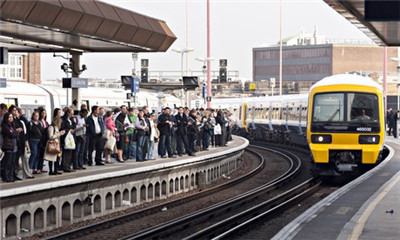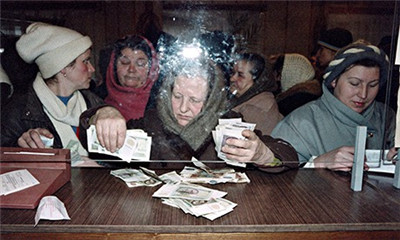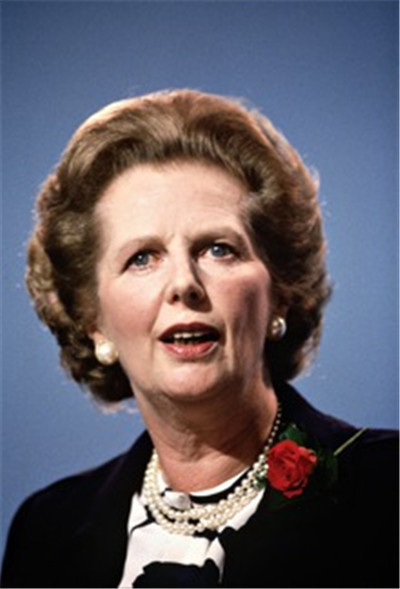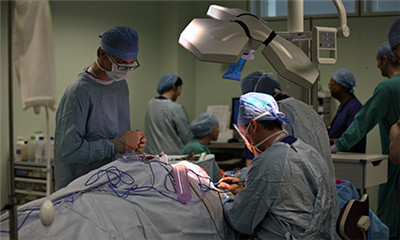(单词翻译:单击)
Privatisation promised to turn the UK into an island of small shareholders. It failed: the faceless state bureaucrats have been replaced by faceless (better-paid) private bureaucrats – and big foreign corporations. How did we get to this point?
“让每一位英国人成为联合王国的股东”曾是推行私有化时的承诺。这是在愚弄大众:不知羞耻的政府官僚已经变成了不知羞耻且收入更高的私人官僚和国外大公司。我们是如何的处以上结论的呢?

London Bridge train station. Photograph: Alex Segre/FlickrVision
Train fares are going up. We learned that last week, although "learn" is putting it strongly. We knew they would. It's not as if they would go down: train fares go up, like electricity bills, gas bills, water bills, rent and chief executives' salaries. To the loyalists of the Thatcher-Blair-Cameron succession, higher train fares are a positive, because they mean lower subsidies: another incremental step in a 35-year programme to shift the burden of paying for infrastructure from the well-off to the strugglers. To most of us, it's another sign of the folly of selling off the railways. But amid the dismal annual round of fare rises, it's easy to miss another, stranger, more gradual sign of the failure of the vast social and economic experiment conducted on the British people since 1979: privatisation.
火车票价要上涨。我们上周获知此消息,虽然票价上涨会引起民众的强烈不满,但是我们知道涨价已不可避免。正如水电气价格、租金和高管薪金一样,火车票不会再降价了。对于撒切尔--布莱尔--卡梅伦之流的支持者来说:高票价是件好事,因为这意味着(给铁路系统的)财政补贴会减少。此外,过去35年中实行的按年递增的工资制度,将基础设施建设的财力负担从家财万贯者身上转移到了劳苦大众的肩头。在大多数民众看来,这又是一个出售铁路为荒唐之举的标志。但是当你为逐年递涨的票价而凉从心起时,却极易忽略另一个奇怪的逐年显现的标志:自1979年开始,在英国推行的大范围社会和经济试验——私有化改革——是失败的。
A trio of awkward synthetic words has begun to appear among the owners of private train companies that looks as if a computer has been asked to name the new musketeers: Abellio; Govia; Keolis. What these bland corporate signifiers mask is state-owned but commercialised European rail firms. Collectively, European state railways now own more than a quarter of Britain's passenger train system.
“Abellio、Govia、Keolis”三个当代“火枪手”的名字更像是计算机起的,这三个尴尬的合成词已经开始影响到私营铁路公司的老板们。这三家公司表面上平淡无奇但实际上是商业化运营的欧洲国有铁路企业。概括来讲,欧洲国有铁路公司现在拥有超过四分之一的不列颠客运铁路。
注:Abellio是欧洲交通运输服务商,持有英国北方铁路50%的股份。Govia是英国铁路运营商,其两大股东为Go--Ahead 和Keolis分别持有起65%和35%的股份Keolis是法国交运商。
I imagine they will do a decent job. And that's the trouble. If competition shows that the best companies to run Britain's privatised railways are state-owned railways from other countries, what does that say about the justification of privatisation? And what does it say about what privatisation has done to Britain? How did we get to the point where this country's railways, power stations and postal service were ready to be taken over by foreign versions of British organisations that our own government, claiming patriotism, systematically took to pieces?
我设想他们会干的漂亮一些。而这正是问题所在。如果竞争显示经营英国私有铁路最好的公司是来自其他国家的国营铁路公司。谈何还要为私有化辩解呢?谈何实现英国铁路私有化呢?如果国家的铁路、电厂和邮局都准备由英国国有机构的外国翻版来接管,我们的政府为何还要宣称爱国,系统地分割产业,这种局面要发展到何种程度?
One winter's morning in 1991 I loaded a guitar, a condensed edition of the Oxford English Dictionary and a Teach Yourself Russian course into an old Volkswagen, left the house near Edinburgh where I had been staying and drove to Kiev. Five days passed on the road. I left the familiarity, order and prosperity of Britain, the island where I had grown up, and travelled east to wait for the Soviet Union to dissolve. I didn't have to wait long. A few weeks after I arrived, it ceased to be. Russia and Ukraine went their separate ways. The Kiev traffic policeman waving down my foreign-plated car had time to utter the words, "What are you doing in the Soviet Union?" before the colour left his face, his mouth went dry, and he turned away, lost, a bully orphaned of his corporate father.
1991年冬天的一个早上,我把一把吉他、一本精炼版牛津英语字典和一本俄语自课本装进我的老大众汽车,离开爱丁堡的家,驶往基辅。经过5天旅程,我离开了家乡,有秩序并且繁荣的英国,离开了养育我的英伦岛,向东行驶,等待着苏联解体。我并没有等太久。到了基辅几周后,这里不再属于苏联。俄罗斯和乌克兰分裂成两个国家。基辅的交通警察挥手拦下了我的外国牌照车,费尽地说出几个字“你来苏联干什么?”,随后便面无血色,变得哑口无言,转身走开,仿佛被他父亲一样的体制抛弃虐待的孤儿一般。
A 70-year experiment to test whether the ethos of the commune could be imposed on a transcontinental empire of hundreds of millions of people was over, long after the answer was in (it couldn't). I wasn't sorry to see Soviet communism go. Despite all that's happened since, I still don't mourn it. There was hope in the beginning that something fine would grow in the gap that was left. It was a while before I realised the cynical, grasping figures who moved in to take possession of the ruins were not, as I had hoped, transitional symptoms of change, but the essence of that change.
70年的经验证明,强加给这个拥有数亿人口横跨欧亚的帝国的人民公社式民族精神业已破灭,结果早已注定。我对苏联社会主义的结局并不感到惋惜。尽管一切都很痛苦,我不会为之感伤。在留下的裂痕中仍会爆发新生希望。转瞬间我意识到,那些挤进来掌控废墟的贪婪而又见利忘义的人物并非我想象的那样,不是要带来暂时的转变,而是要发生实质的变革。

Ukrainian women exchange Soviet rubles against Ukrainian karbovanets, on January 17, 1992 in Kiev. Photograph: SERGEI SUPINSKY/AFP
1992年1月17日摄于基辅,乌克兰妇女将苏联卢布兑换成乌克兰元。
Watching the vultures come to feast on the carcass of the world's largest state-owned, planned economy, I began to find the terms to question what had been done by politicians, economic theorists, lobbyists and business people in my own country. I had thought, when I left Scotland, in the unconscious way certainties are stowed in one's mind, that I knew Britain; that some essential way of being would be resilient to Margaret Thatcher's rearrangements, which must, as transient policies, be superficial. I had to go home by way of Kiev and Moscow to see that I was wrong, to begin to see how, and how deeply, she and her followers altered Britain.
如同秃鹫们分享腐尸盛宴一般,看到这个世界上最大的国有计划主义经济体发生的变化,我开始质疑我的祖国里政治家、经济学家、游说者们以及商人们的做法。当我离开苏格兰时,一种难以察觉的不确定性便一直印在我的脑海中。我知道英国必须要推出一些能够弥补撒切尔时的改革做法的实质性措施,因为当时只是临时性政策,解决问题较为肤浅。只有游历过基辅和莫斯科,回到祖国后我才发现自己错了,开始明白撒切尔和她的追随者们给英国带来的改变会如此深远。
With hindsight, 1991 was a pivotal year. When it began, the free market economic belief system, with its lead proselytisers Thatcher and Ronald Reagan, had been pushing back for more than a decade against various attempts to impose levelling communitarianism around the world. The Berlin Wall had fallen, as had communist regimes in Poland, Czechoslovakia, Hungary, Romania and Bulgaria. The market belief system, which holds that government is incompetent by default, that state taxation is oppressive, that the desire for wealth is the right and principal motivator of achievement and that virtually all human wants can best be met by competing private firms, was becoming entrenched in the non-communist world, from Chile to New Zealand. Made bold by a popular public perception that government overspending and selfish organised labour were to blame for economic stagnation and high inflation in the 1970s, Thatcher and Reagan had taken on powerful trade unions, and won.
之后来看,1991是一个关键之年。坚定信徒撒切尔夫人和罗纳德▪里根在全世界对抗各种试图增强社区主义,使得自由市场经济信仰体制开始的时间,推迟了十多年。正像共产主义政权在波兰、捷克斯洛伐克、匈牙利、罗马尼亚和保加利亚那样,柏林墙也轰然倒塌。市场信仰体制认为,政府本就不该干涉市场,国家征税是沉重的,对财富的渴望是每个人的权利,也是取得成就的主要动力,几乎所有人的愿景都能通过私有企业的竞争得到最大化的实现,从智利到新西兰,在非共产主义世界这种观念正在变得根深蒂固。在1970年代 ,公众普遍认为政府过度开支,而自私的劳工组织责备经济停滞和通货膨胀,因此,撒切尔和里根大胆的尝试壮大工会组织,并取得了胜利。
Barriers to the international movement of goods and money had fallen; the European Union was, on paper, a single marketplace. In Britain, restrictions on how much ordinary people could borrow to finance their everyday needs had been scrapped, and millions had acquired credit cards. Volumes of regulations controlling how banks were allowed to use people's deposits had been torn up, and unimaginably vast sums were being moved privately from country to country. Government spending had been cut, as had income tax and corporation tax. Sales tax and fees for everyday services had been raised. Council houses and big state enterprises had been privatised, with more on the way, leading to hundreds of thousands of redundancies. Thatcher's programme in Britain was an inspiration for the IMF and the World Bank as they experimented with the conditions they attached to bail-out loans to developing countries.
国际商品和资金流动壁垒降低;而理论上欧盟则是一个单一市场。在英国,普通人可以借钱来维持他们的日常需要的限制已经取消了,数百万计的人已经获得信用卡。大量关于控制银行如何才能被允许使用人们存款的法规被废除了,难以想象巨额财富被私下从一个国家转移到另一个国家。政府支出被削减,就像个人所得税和公司所得税。销售税和日常服务费用已经提高。政府办公楼和大国企已经被私有化,而更多的也将紧随其后,导致了成千上万的裁员。撒切尔在英国的计划启发了国际货币基金组织和世界银行,他们试图将此作为给发展中国家提供纾困贷款的条件。
But at the end of 1990, the triumph of marketism seemed to hang in the balance. Reagan and Thatcher had relinquished the stage to less fervent, less charismatic successors. The man who'd introduced the market economy to China, Deng Xiaoping, had been blamed by traditional communists for fostering the Tiananmen Square protests, and was in disgrace. In the Soviet Union Mikhail Gorbachev, the great hope of free marketeers, was facing a similar backlash from hardliners, and the Baltic countries' hopes of escape from the USSR looked bleak. Saddam Hussein, dictator of semi-socialist Iraq, had invaded semi-capitalist Kuwait.

Margaret Thatcher in Bournemouth, Dorset in 1986. Photograph: David Levenson/Getty Images
1986年,玛格丽特·撒切尔在伯恩茅斯,多塞特郡。摄影:David Levenson/Getty图片
但在1990年底,市场原理者的胜利似乎不再如此肯定。里根和撒切尔已经让位给了对此更少热情和魅力的继承者。将市场经济引入中国的邓小平,受传统共产主义批评。在苏联,对自由市场经济充满厚望的戈尔巴乔夫,同样遭受到来自强硬派的反对,波罗的海国家希望逃离苏联看起来暗淡无光。半社会主义伊拉克的独裁者,萨达姆·侯赛因,入侵了半社会主义的科威特
Yet the following year conviction began to grow among the marketeers that the final defeat of centrally planned, communitarian government was at hand, the sense that seemed to confirm such ideas as America having "won" the Cold War, and the "end of history". Early in 1991 it became clear that the Soviet leadership had lost the necessary unanimity and ruthlessness to keep Lithuania within the USSR. The humiliating collapse of the coup against Gorbachev that summer presaged recognition of Baltic independence, Ukraine's vote to go the same way, and the end of the Soviet Union. In Kuwait at the beginning of the year I saw experienced British war correspondents squabble for reporting billets among the frontline troops with the ferocity of those who believe something is being offered for the last time; we thought British and American armies might never fight another war. Few doubted Saddam would be beaten, and he was. That November, as I drove off the ferry at Ostend, heading east, it seemed a racing, expanding tide of victorious free marketism glimmered at my wheels, a tide that has gone by many names – consumer capitalism, Reaganism, Thatcherism, neoliberalism, the Washington Consensus. Though the watchtowers still stood at the old border between two Germanys, the border was gone. In eastern Germany, the narrow cobbled streets of medieval towns had jammed solid with second-hand cars. I passed a field where an impatient western German DIY chain, unwilling to wait for steel and breeze blocks, had erected a vast, circular retail marquee, blazing with lights. The canvas superstore seemed to have landed, like a spacecraft from a flashier civilisation, come down to offer shrink-wrapped packs of rawl plugs and a choice of bathroom fittings. In Poland, I got lost in fog near Wrocław, and saw how small shops had sprung up everywhere, even in the tiniest villages. In the middle of the night, in the middle of nowhere, in damp, coal-scented murk so thick I wasn't sure which way my car was pointing, I came across an entrepreneur hawking coffee from a roadside kiosk; the best coffee I ever tasted. He was like a champion of Thatcherite values, the small businessman standing ready to serve at all hours, in all weathers, making up for lost time under communism, silently mocking the market-questioning scepticisms I had brought with me from Scotland.
然而,第二年越来越多的市场人士认为我们即将战胜那些采取中央计划的社会主义政权,似乎确定美国已经取得冷战的“胜利”,并且“结束了旧的历史”。1991年早些时候,很明显苏联领导层已经失去了一致拥护,并且强制将立陶宛保留在苏联内部。当年夏天发生了反对戈尔巴乔夫的耻辱性政变,成为波罗的海国家的独立先兆。在科威特,年初我看到经验丰富的英国记者们看到那些闻所未闻的暴行后,激烈争论是否要报道前线部队的部署情况。我们认为英国和美国根本不会再次加入战争。很少有人怀疑萨达姆会被打败,而他真的被打败了。当年11月,当我在奥坦斯德驶下轮渡前方东欧时,似乎一场自由市场主义潮水般竞赛式扩张就在前方,人们把这股洪流冠以很多名称,包括:消费资本主义、里根主义、撒切尔主义、新自由主义以及华盛顿共识。虽然两德边境的瞭望哨仍然耸立,界墙却已消失。在东德,狭窄的中世纪城镇街道上堵满了二手汽车。我路过一片田野,那里迫不及待的西德DIY人士,不愿等待钢铁路障的拆除,建立了一大片环形零售商业区,放出耀眼的灯光。帐篷超市似乎已经扎根,就像来自宇宙飞船上的浮华文明集市,降临到这片土地,售卖着塑料膜包裹的初加工插座和一些浴室用具。在波兰,浓雾导致我在华沙附近迷了路,看到小型商店如雨后春笋般出现在各个地方,甚至在最小的村庄中也能觅得踪迹。午夜时分,在不知名的地方,煤炭的气味非常重,以至于我知道汽车驶往何方,我碰巧进到了一个路边的私人咖啡馆里,品尝到从未喝过的最好咖啡。店主人是撒切尔价值观的极度拥戴者,这位小老板已经准备好无时无刻都要营业,以弥补共产主义统治时失去的时光,并且委婉的嘲讽了我从苏格兰带来的那些对市场经济的怀疑思想。
The effect on me of witnessing the unplanned collapse of a planned economy, where there'd been virtually no private property or private enterprise, was a series of viscerally direct lessons in economics. I saw how badly the Soviet communist system had failed on economic grounds alone, quite apart from its denial of personal freedoms. Long before the end, there was a hopeless housing shortage. Multiple households were sharing two-roomed flats; families were living in dormitories. Apartments seized from their bourgeois owners after the 1917 revolution were still unrepaired more than 70 years later. The infrastructure was rotten; there were cities and suburbs built around factories in the 1960s and 1970s where homes only had mains water for a few hours a day. Surpluses of goods nobody wanted (copies of the complete works of Soviet politicians, busts of Lenin) prevailed beside shortages of goods everybody wanted (cheese, coffee, sausage) because the element sticking together demand for a thing and the amount of trouble it took to produce and deliver it – the price – had been scraped out of transactions and replaced with a made-up figure concocted by planners in Moscow. Inequality was rampant, reflected not just in monetary wealth or property but in the degree to which you actually had access to the cheap goods everyone was supposed to have access to. One consequence of food and drink being allocated by civil servants according to central decrees, rather than by price, was that the restaurant business became an incubator for the black market and organised crime. Airports and railway stations looked like refugee camps because tickets cost virtually nothing, yet there weren't enough flights or trains to move the people who wanted to take them. The first response of the Russian and Ukrainian authorities after independence was to massively increase the production of a single essential item that people were chronically short of: money. Hyperinflation resulted, and millions of people had their savings wiped out.
看到事实上在缺少私人资产或私人企业局面下,计划经济出人意料的崩塌,作为一系列针对经济问题直插肺腑的教训,给予我很大触动。我看到苏联社会主义机制仅仅在经济领域的表现便如此糟糕,更不用提剥夺个人自由问题。长久以来,人们对租赁住房早已失去信心。几个家庭要共同分享只有两个房间的公寓,家庭如同宿舍。70多年后,经历1917年革命从资本家手中夺取的楼房年久失修。基础建设破败不堪。60至70年代间围绕厂矿建立的城市和乡镇中,每天只有主要时段才供应自来水。由于捆绑着需求与生产供应投入(即价格)之间的元素已经完全脱离市场,并且由莫斯科的计划者们通过定价而操纵,导致了没有人想要的累赘(例如苏联政治家列宁的著作)随处可见,人人想得到的生活必需品(奶酪、咖啡、培根)则极为短缺。公务员们根据中央规定而不是价格因素进行食品分配带来的后果便是餐饮行业成为黑市和团伙犯罪的温床。机场和火车站看起来像难民营,因为票价基本为零,然而仍旧没有足够数量的飞机或火车运输旅客。独立后,俄罗斯和乌克兰当局的第一反应便是大幅增加个人生活物资的生产。极度通货膨胀导致长期以来人民一直缺乏货币,并且货币贬值导致数百万人的储蓄瞬间蒸发。
The other side of the collapse of communism, along with the post-Soviet boons of freedom of movement, freedom of expression and freedom of initiative, was the flourishing of enterprise. Armies of tough middle-aged women made epic journeys to the bazaars of Poland, Turkey and China and returned to Ukraine and Russia with clothes to dress a handsome people as they'd yearned to dress, in jeans, leather and gold. Shops, restaurants, bars, cafés and night clubs opened up; book and music stalls were everywhere. Foreign firms brought wonders: a tampon factory, international direct dialling. Kiev went from a place where you couldn't buy anything to a place where you could buy anything, if you had the means.
社会主义倒台的另一面体现在私人企业与后苏联的福利包括:自由主义运动、自由言论和自由主义精神一起繁荣发展。壮硕的中年妇女大军长途远征波兰、土耳其和中国的集市,把漂亮的衣服和装饰带回到乌克兰和俄罗斯,因为他们渴望着精美服饰、牛仔、皮装以及黄金饰品。商店、餐馆、酒吧、咖啡厅和夜总会纷纷开业,书店和音乐用品店随处可见。国外企业引入了新奇理念,包括:生产卫生棉的工厂以及国际市场直销等。基辅从一个你什么都买不到的城市瞬间变成只要你想要便应有尽有的地方。
Contempt for the planned economy, a new appreciation of the danger of printing excess money, gratitude to the entrepreneurs – there were times, in those early months in Kiev, that I asked myself whether I was becoming a Thatcherite. I can't pinpoint the moment when it soured for me. It might have been the sight of a solid rank of impoverished pensioners, some several hundred respectable old ladies, standing shoulder to shoulder in the freezing winter darkness outside Belarus station in Moscow, each holding a single sausage for sale – the free market as desperation. Or a visit to the Arctic mining city of Vorkuta, where miners were being paid in sandwiches while their bosses pocketed the money from the coal for which they were earning free-market prices.
蔑视计划经济的同时,一个新的想法便是要认识到超发货币的危险。得益于私人企业主的启发,在基辅的头几个月我很多次问自己是否也成为一名撒切尔主义者了。令我无法回想起这种观点何时伤害过我。或许能够看到领取补助金的贫困人口长长的名单,看到在黑暗刺骨的冬日里,几百名体面的老妇人肩挨肩地排在莫斯科白俄罗斯车站外,每个人手中拿着一根培根在卖,显示出对自由市场的绝望。或者来到北极圈中矿业城市沃尔库塔,那里的矿工们的工资只是一些三明治,而老板们腰包鼓鼓,装满将煤炭按自由市场价格售出而窃取的金钱。

A surgeon performs a neck and throat operation in the recently opened Birmingham Queen Elizabeth Hospital Photograph: Christopher Furlong/Getty Images
最近建成的伯明翰伊丽莎白皇后医院里,医生们正在进行一次喉颈部手术。摄影:福隆,盖提图片社。


